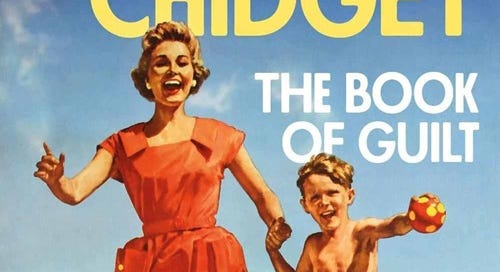Chidgey Goes Dystopian—and It’s Disturbingly Brilliant
This week we take a look at a book that probably needs no introduction, because it has been everywhere - and deservedly so. If you have been living under a rock let me introduce you to The Book of Guilt by Catherine Chidgey.
If you’ve ever wanted to feel deeply unsettled while simultaneously in awe of a writer’s control, The Book of Guilt is your book. Catherine Chidgey delivers a masterclass in creeping dread and psychological precision—this is a story that feels like a half-remembered dream, the kind where you wake up and just feel unsettled.
A Haunting Masterpiece in an Unfamiliar England
The Book of Guilt is Chidgey’s first foray into dystopian fiction, and what a bold leap it is. Set in a reimagined 1979 England, where Hitler was assassinated mid-war and a swift peace led to unsettling scientific collaborations, this is a nation recognisable in name only. The story centres on identical triplets—Vincent, William and Lawrence—raised in a government-run children’s home as part of the now-defunct “Sycamore Scheme.” The boys live under sterile routines, monitored by rotating “Mothers,” medicated against a mysterious affliction known only as “the Bug,” and indoctrinated with the promise of reaching the fabled Big House in Margate. Their present is bleak, their past murky, and their future illusory. Alongside Vincent’s recollections, Chidgey intercuts two equally haunting narratives: Nancy, a girl imprisoned by love and parental delusion, and the Minister of Loneliness, who is tasked with winding down the Scheme while quietly shouldering the moral rot at its core. It’s disturbing, thought-provoking, and, in true Chidgey fashion, utterly engrossing.
Is It Her Best? Not Quite—But Close
Let me be clear: The Book of Guilt is an easy five stars. It’s original, deeply unsettling, and beautifully written. And I’m genuinely thrilled to see it getting the international attention Chidgey has long deserved. But if we’re talking favourites, my heart still belongs to Remote Sympathy—a novel that, for me, struck the perfect balance of emotional depth, historical horror, and character complexity. If you’ve devoured The Axeman’s Carnival, Pet, or this latest masterwork and found yourself spellbound, please do yourself a favour and pick up Remote Sympathy. It’s where Chidgey’s thematic obsessions—power, complicity, moral ambiguity—coalesce into something unforgettable.
Final Thoughts
What Chidgey achieves in The Book of Guilt is astonishing: a speculative narrative that feels all too plausible, steeped in our darkest historical echoes yet disturbingly modern. She explores how states dehumanise, how people look away, and how guilt—both personal and collective—seeps through even the most well-fortified denials. It’s bleak, yes, but never gratuitously so. Chidgey balances horror with grace, insight with elegance.
Start here if you like your fiction bold, smart, and morally unsettling. But don’t stop here. The Chidgey backlist is rich, and Remote Sympathy awaits with open (if slightly trembling) arms, because life is too short to read bad books.



